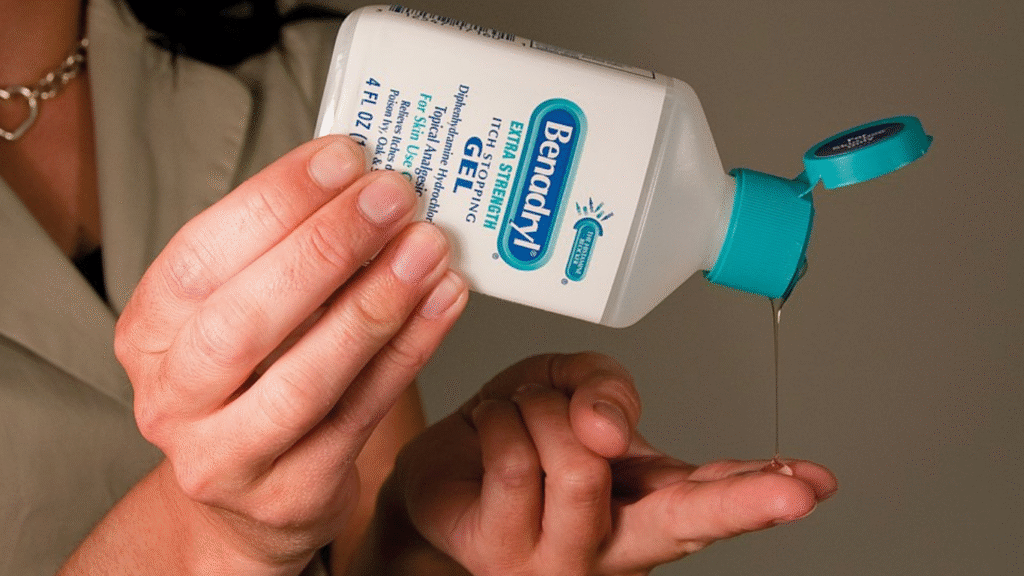“Wait… why can’t I find Benadryl Cream anymore?”
If you’ve recently scoured pharmacy shelves or searched online only to find Benadryl Cream mysteriously absent, you’re not alone — and you’re definitely not imagining things.
For decades, Benadryl Cream was a go-to solution for soothing itchy skin, insect bites, and mild allergic reactions. So what happened? Why has Benadryl Cream been discontinued, and what does it mean for people who relied on it?
Let’s dive into the facts, clear up the confusion, and help you find safe, effective alternatives.
What’s Behind the Discontinuation of Benadryl Cream?
If you’re asking this question, you’re probably looking for clarity about a product you’ve trusted for years. Whether you’re managing seasonal allergies, skin irritation, or just want relief from itchy bug bites — this article is here to explain the why and what next.
The Real Reason Behind the Disappearance
Benadryl Cream — specifically the topical diphenhydramine version — has been voluntarily discontinued by Johnson & Johnson, the parent company of Benadryl. But here’s the kicker:
It wasn’t recalled due to a safety crisis or a major lawsuit.
Instead, it’s more about business strategy and medical guidance than public panic.
1. FDA Warnings and Evolving Medical Guidance
In recent years, the FDA and dermatologists have raised concerns about topical diphenhydramine, the active antihistamine in Benadryl Cream. While it’s effective for itching, using it on broken or inflamed skin may:
- Cause increased absorption into the bloodstream
- Lead to local skin sensitivity
- Rarely, cause allergic contact dermatitis — the exact thing it was meant to treat
These concerns prompted medical experts to re-evaluate the long-term safety and necessity of topical antihistamines when other safer alternatives (like hydrocortisone or oral antihistamines) are widely available.
2. Strategic Product Streamlining
Pharmaceutical companies regularly review their product lines to:
- Focus on best-selling products
- Reduce redundancy
- Comply with updated safety guidelines
- Improve profit margins in changing markets
Benadryl Cream, despite its popularity, was one of many similar itch-relief products. With increasing regulatory pressure and market alternatives, it likely didn’t make the cut.
H2: Is Benadryl Cream Banned or Unsafe?
Let’s clear the air — Benadryl Cream isn’t banned.
It hasn’t been pulled due to contamination or dangerous side effects in the general population.
The discontinuation is a proactive, voluntary move, not a forced ban or recall. That’s an important distinction.
Many people used it safely for years, but as with many medicines, what was once the go-to isn’t always the best choice forever. Medicine evolves. Recommendations change.
What Should I Use Instead?
If you’re wondering what to grab next time the itching hits, don’t worry — there are effective, doctor-approved alternatives that work just as well (and in some cases, even better).
Over-the-Counter Alternatives to Benadryl Cream
Here are a few proven options:
- Hydrocortisone Cream (1%)– Reduces inflammation and itching
- Calamine Lotion– Soothes itching and dries oozing skin
- Oral Antihistamines (like Benadryl Tablets or Claritin)– Great for systemic allergic reactions
- Cooling gels with menthol or camphor– Provide temporary relief with a cooling sensation
Pro Tip: Always apply these on clean, unbroken skin unless your doctor says otherwise.
Are There Risks With Using Other Topical Antihistamines?
Yes — and this is part of the reason Benadryl Cream was discontinued.
Many topical antihistamines, including generics, carry a small risk of causing allergic reactions themselves. They’re not usually the first choice anymore.
Doctors now recommend other topical agents like hydrocortisone or calamine, especially for kids and those with sensitive skin.
What Should You Do If You Still Have Benadryl Cream?
If you’ve got an old tube stashed in your medicine cabinet, check:
- Expiration date – Using expired medication can reduce effectiveness and may be unsafe.
- Condition of the cream – If it’s discolored or smells odd, toss it.
- Current medical advice – Consult your doctor or pharmacist before continuing use.
Bottom line? Don’t panic — but consider moving to an alternative.
FAQs — What People Also Ask
Why is Benadryl Cream not available anymore?
It was voluntarily discontinued by the manufacturer, likely due to safety concerns, medical recommendations, and market strategy, not a product ban.
Can I still buy Benadryl Cream anywhere?
Some leftover inventory may still be available at local pharmacies or online, but it’s no longer in active production. Be cautious of third-party sellers and always check expiration dates.
Is it safe to use other topical diphenhydramine products?
Many experts recommend against routine use of topical antihistamines, especially on open or inflamed skin. Safer alternatives exist and are often more effective.
What’s the difference between Benadryl Cream and Benadryl pills?
Benadryl Cream: Topical, local relief for itching
Benadryl Tablets: Systemic relief from allergies, hives, or hay fever
The pills are still widely available and recommended for systemic allergic reactions.
The Takeaway — Time to Switch It Up
Change is uncomfortable, especially when it involves a product you’ve trusted for years. But the discontinuation of Benadryl Cream is a reminder that medicine and best practices evolve — often for our safety.
If you’re dealing with itchy skin or allergic reactions, know that you’ve got reliable, effective options still on the shelf.
Check with your pharmacist for the best alternative for your needs — and when in doubt, go with what’s proven to work and recommended by today’s medical experts.
